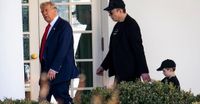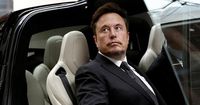The Pentagon is set to brief Elon Musk on military plans for a potential war with China, an event that has raised immediate questions about conflicts of interest amid Musk's extensive business ties to both the U.S. government and China.
Elon Musk, the billionaire CEO of Tesla and SpaceX, is scheduled to visit the Pentagon on March 21, 2025, for a briefing that will cover the U.S. military’s strategies in the event of conflict with China. This follows long-standing tensions between Washington and Beijing over issues such as trade, cybersecurity, and territorial disputes including Taiwan.
This high-profile briefing, confirmed by Pentagon spokespersons, will reportedly include about 20 to 30 slides detailing the America’s operational plans, classified documents that outline how the United States intends to respond to a military confrontation with China.
Defense Secretary Pete Hegseth stated, "The Defense Department is excited to welcome Elon Musk to the Pentagon on Friday. He was invited by Secretary Hegseth and is just visiting," downplaying the significance of the meeting. Yet, this briefing could expand Musk's responsibilities as an unoffical adviser to President Trump, who has previously urged significant cuts in government spending.
Critics have highlighted the potential ethical conflicts arising from Musk’s dual role as a defense contractor and a presidential advisor. Musk’s SpaceX is already under contract with the Pentagon, receiving billions for various military contracts. His company is integral in launching military satellites and providing communications systems, illustrating how intertwined his business interests are with national security.
Moreover, SpaceX was awarded approximately $1.6 billion in contracts from the Air Force last year, establishing it as a critical player in U.S. military operations, especially regarding new satellite networks aimed at countering threats from adversaries including China.
Hegseth, along with high-ranking military officials, will present Musk with broader overviews of the potential conflict strategies, contrasting the Pentagon's public assurances of the meeting's informal nature against the serious implications it carries given Musk's vast corporate interests.
Further complicating this scenario is Musk's acknowledged financial dependency on the Chinese market. Tesla’s factory in Shanghai is crucial for the company, making up a significant portion of its global deliveries. In 2024, Tesla announced a $2.8 billion loan agreement with Chinese lenders, solidifying its stakes in the region.
Critics have argued about the appropriateness of granting Musk access to military strategies, especially given that previous inquiries had raised concerns about Musk's compliance with his security clearance. The Air Force had previously denied Musk's request for a higher security clearance, citing potential risks linked to his interests in China.
Military plans involving China have been a focal point of U.S. defense strategy, evolving to account for the growing capabilities of the Chinese military, which has been modernizing rapidly over the past few decades. This shift has underscored preparations not just for traditional warfare but also for new domains such as cyber and space.
Insiders have noted that understanding the U.S. military's approach to potential conflict with China may empower Musk's ongoing advocacy for defense spending cuts, particularly with respect to high-cost military hardware such as the F-35 fighter jets manufactured by Lockheed Martin. Musk has been vocal about halting purchases of expensive military assets, diverting those funds to more cost-effective programs.
As tensions persist between the U.S. and China, this meeting arrives at a crucial intersection of technology and military strategy, raising questions about the effectiveness of defense initiatives in a rapidly evolving geopolitical landscape.
In a statement that echoes skepticism of the briefing’s purpose, Todd Harrison, a senior fellow at the American Enterprise Institute, cautioned: "Musk at a war-planning briefing? Giving the CEO of one defense company unique access seems like this could be grounds for a contract protest and is a real conflict of interest." Such sentiments reflect broader concerns about the implications of privatizing military insights and strategies.
While the Pentagon aims to utilize its relationship with private companies like SpaceX for innovation and efficiency, the necessity of transparency and ethical considerations looms larger than ever. Musk's meeting at the Pentagon acts as a reminder of the blurred lines between government, business, and national defense in a time of increasing complexity in global relations.





